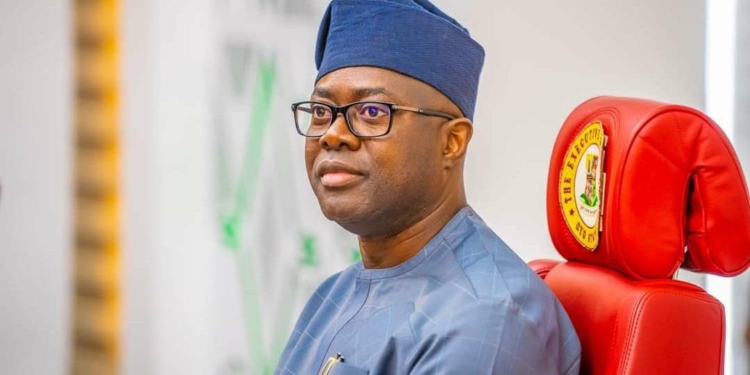- Says the allocation is necessary to effectively manage the state and its resources
Oyo State Governor, Seyi Makinde, has defended the state’s proposed 2024 budget, which includes an allocation of N19,207,579,201.00 (Nineteen billion, two hundred and seven million, five hundred and seventy-nine thousand, two hundred and one naira) to the Governor’s Office.
The proposal, which he said, might be subject to criticisms, became necessary, arguing that the allocation is necessary to effectively manage the state and its resources.
The state’s Commissioner for Budget and Economic Planning and a Professor of Economics, Musibau Adetunji Babatunde, gave the breakdown of the budget estimates on Friday in a parley with Civil Society Organisations and members of the press.
He noted that the funds allocated to the Governor’s Office will be used for a variety of projects, including infrastructure development and social, adding that budget “reflects our commitment to making Oyo State a better place for our people.”
He said: “We recognize that many people may not understand why the Governor’s Office needs such a large allocation.”
“But the reality is that we need to be able to manage the state effectively, and this requires resources. We are committed to using these resources responsibly, and to delivering results for the people of Oyo State.”
In addition to addressing the budget proposal, Makinde through the commissioner also spoke about the importance of transparency and accountability in government.
“We believe that our people have a right to know how their tax money are being spent.”
“We are committed to ensuring that our financial records are open and accessible to the public.”
He added that his administration has been working to improve the efficiency of government operations and to reduce waste.
“We believe that government can be a force for good, but only if it is run responsibly and efficiently.”
According to the commissioner, the 2024 Budget was prepared against the backdrop of continuing global and national economic challenges, noting that the government would execute the budget to bring about sustainable economic recovery in the state.
“The proposed budget reflects the economic recovery plan of the present administration towards addressing the current economic challenges and fast track economic recovery.
“The budget indicates the commitment of the administration to economic reforms necessary for creating opportunities towards achieving economic recovery and also reflects government desires on sectoral allocations to reflate the economy, unlock private investment, stimulate effective demand, accelerate economic growth and achieve sustainable development.”
He added that the highlights of the budget, which according to him, would determine the destiny of the state in the next fiscal year, is adequately captured to reflect the governor’s Roadmap for Sustainable Development 2023-2027 and the Sustainable Action for Economic Recovery (SAfER) programme that followed the subsidy removal and exchange rate unification.
Professor Babatunde equally explained that the estimate for recurrent expenditure in the 2024 Budget proposal is N211,884,445,738.94, representing 48.80 per cent of the budget, while the capital expenditure of N222,337,320,199.85 represents 51.20 per cent of the budget.
He further said that the percentage of the recurrent expenditure estimate was high because it had been designed to capture the monthly wage award of N25,000 to civil servants and N15,000 to pensioners, which increased the state’s wage by an additional N2.8billion in its first month of payment and is expected to run for six months.
He noted, however, that the proposed 2024 Budget would focus more on ongoing capital projects and programmes that would boost human capital, unlock the state’s economic potential through agriculture and agribusiness value chain, tourism and solid minerals development, as well as promotion of Public Private Partnership, among others.
The sectoral analysis of the proposed budget showed the government’s commitment to the economic recovery of the state, as the social and economic sectors, which comprise education, health, youth and sports, culture and tourism, agriculture, works and infrastructure and finance received the largest allocations.
Prof Babatunde also used the opportunity to highlight the revenue projections in the budget draft, stating that the state government looks forward to earning N86 billion in statutory allocations, N71.5 billion in Value Added Tax, N10 billion in Excess Crude, N36.3 billion in capital receipts, among others.
He added that the government has projected N72 billion as the Internally Generated Revenue for the year 2024 at the rate of N6 billion monthly, noting, however, that residents of the states should not exercise fears over tax increment.
Prof Babatunde maintained that the state is reviewing the current tax administration to ensure that more taxable entities are brought into the tax net, while it will also block leakages by improving revenue collection through ICT.
The commissioner also gave an assurance that there would be control and enforcement on spending limits to ensure that a sound budgetary system is put in place to include aggregate fiscal discipline, efficiency and effective spending of the budget.
In his opening remarks earlier, the Permanent Secretary, Ministry of Budget and Economy Planning, Dr Sunday Ojelabi, said the budget breakdown was necessary so as to involve all stakeholders on the implementation of the 2024 Budget.










Discussion about this post